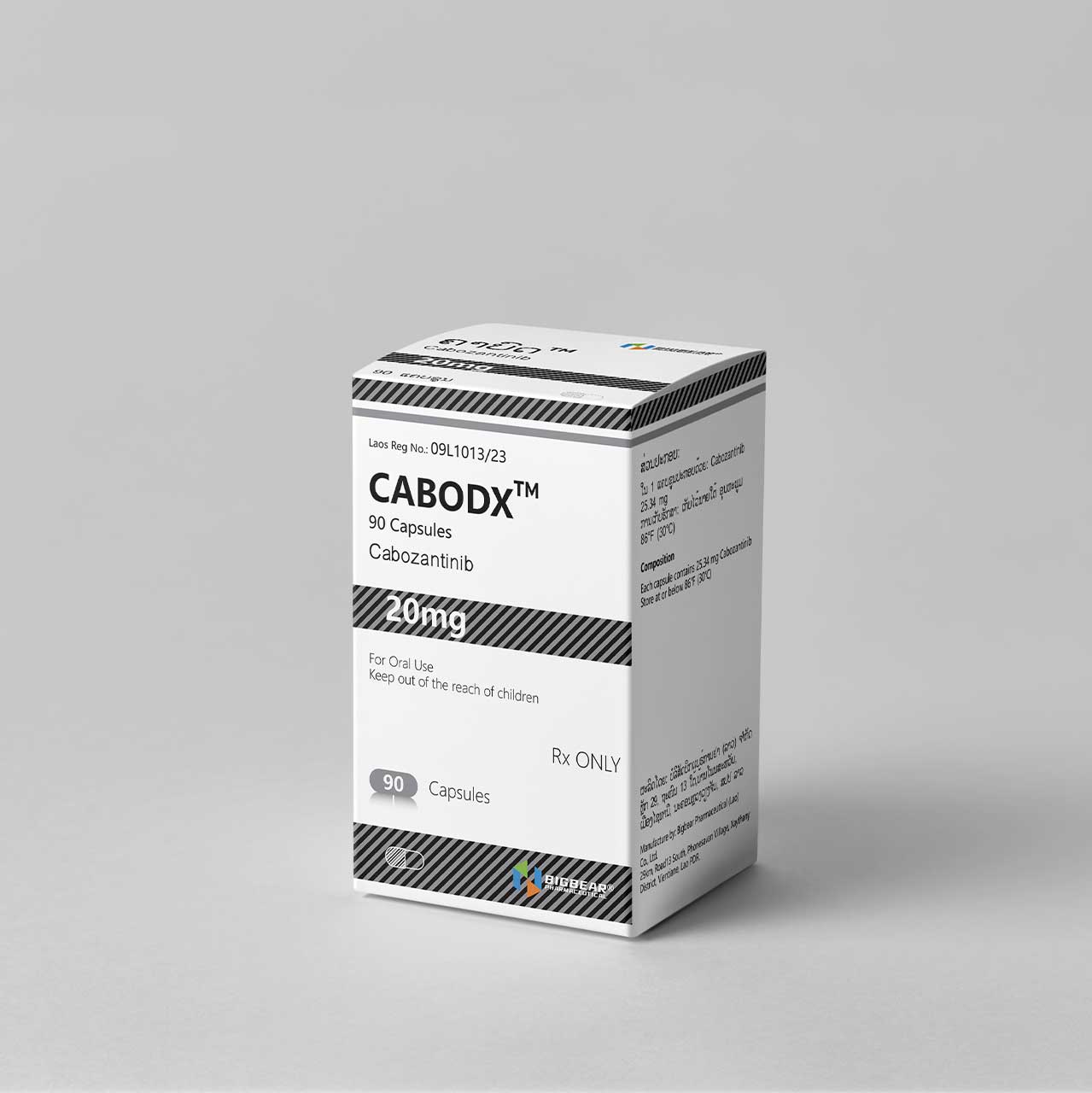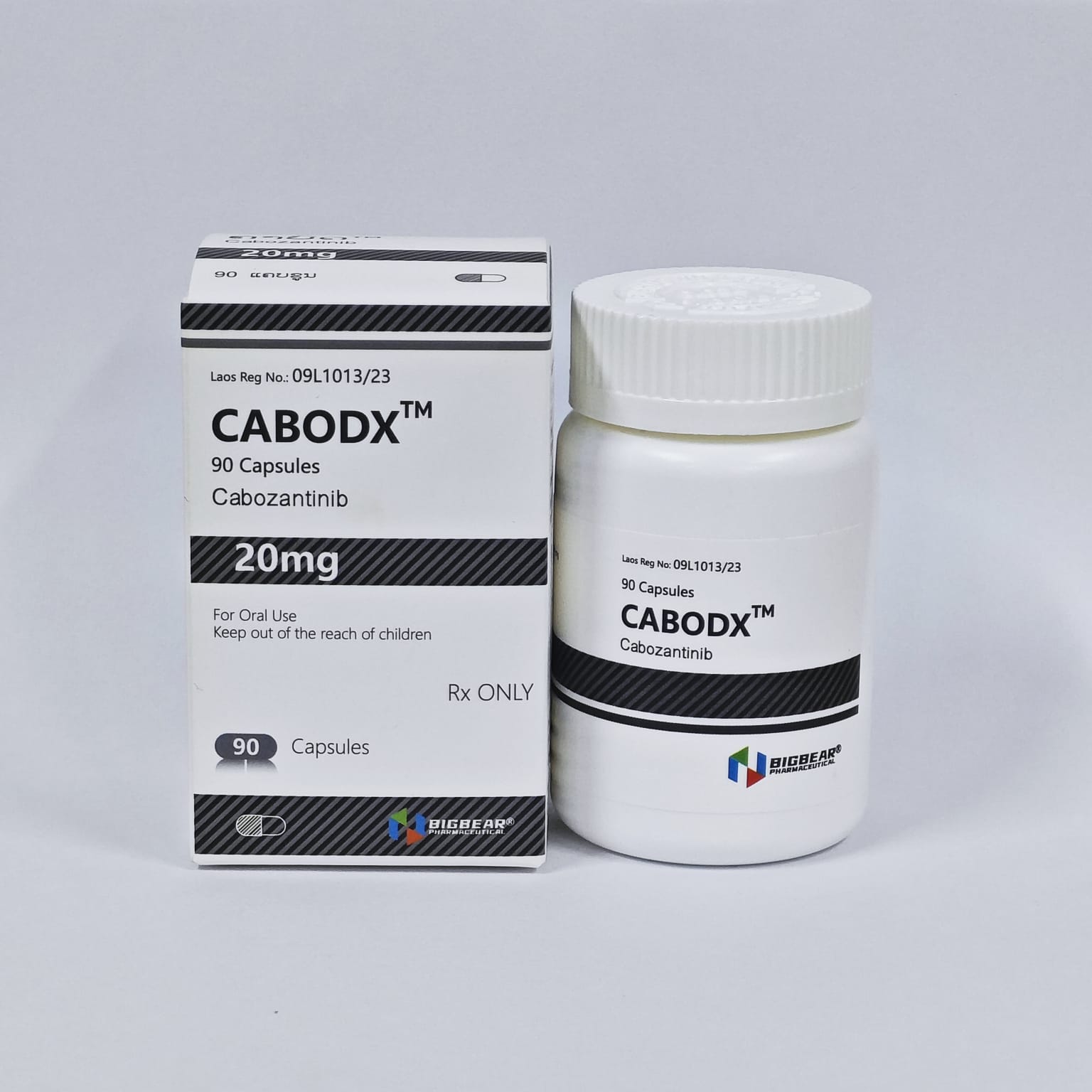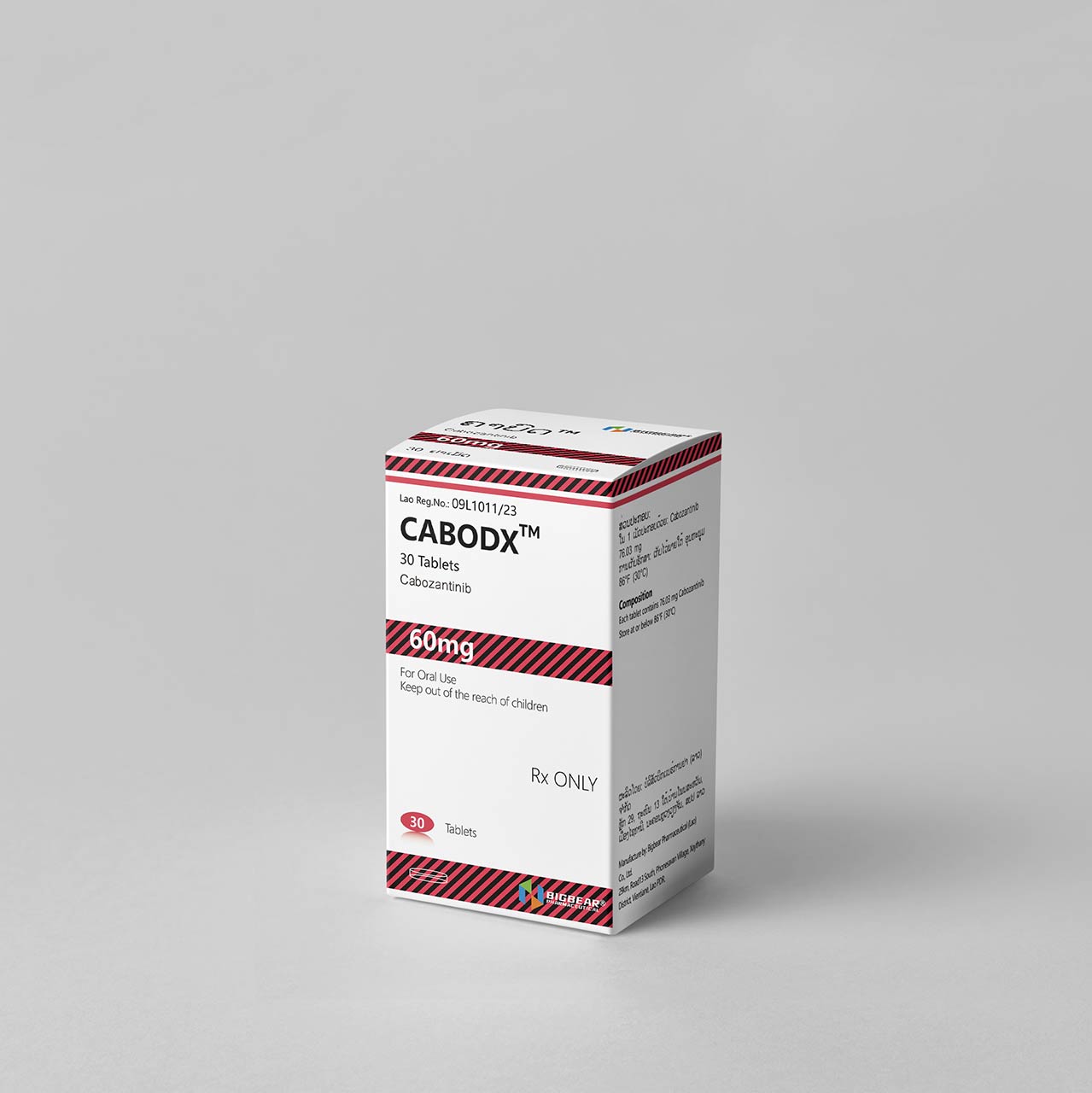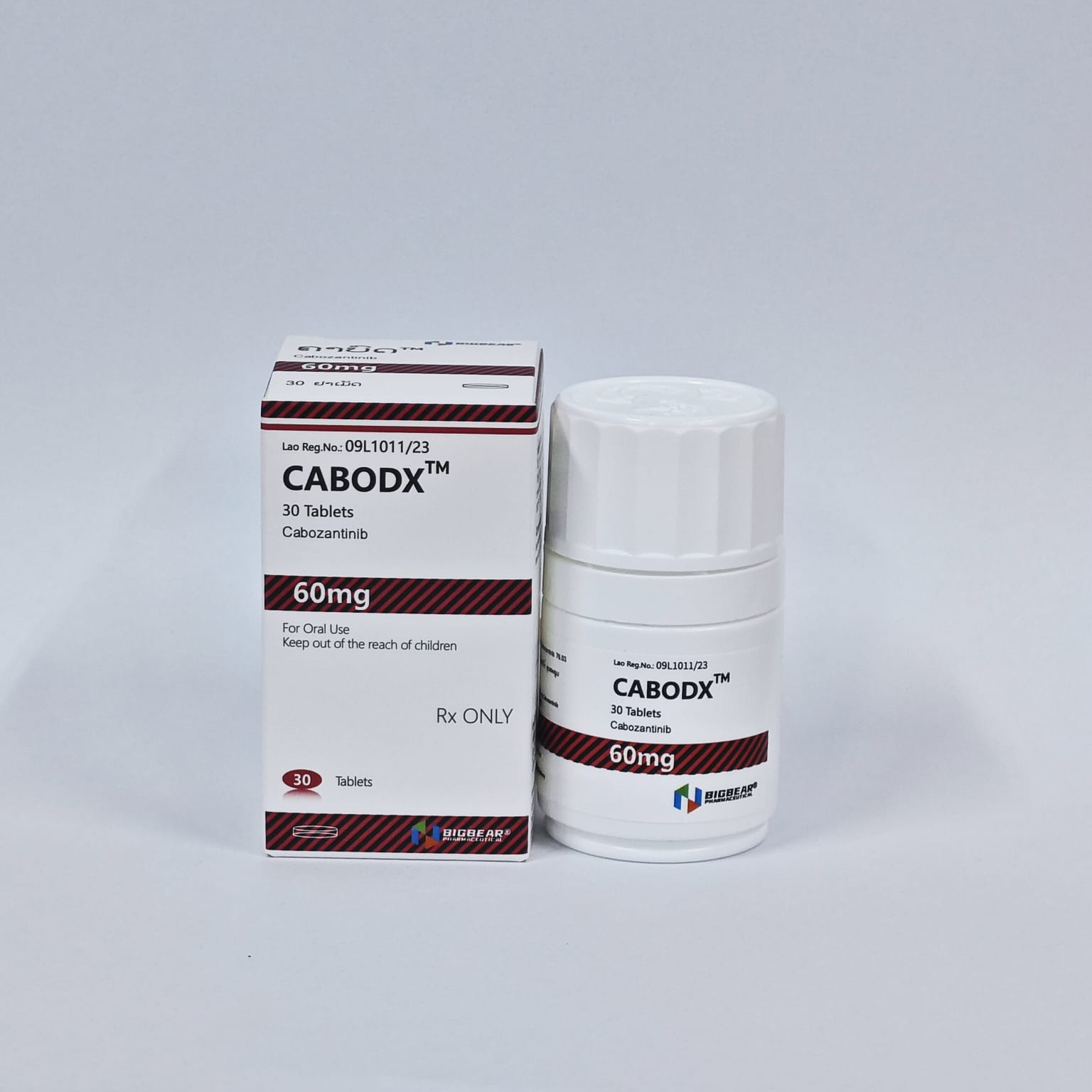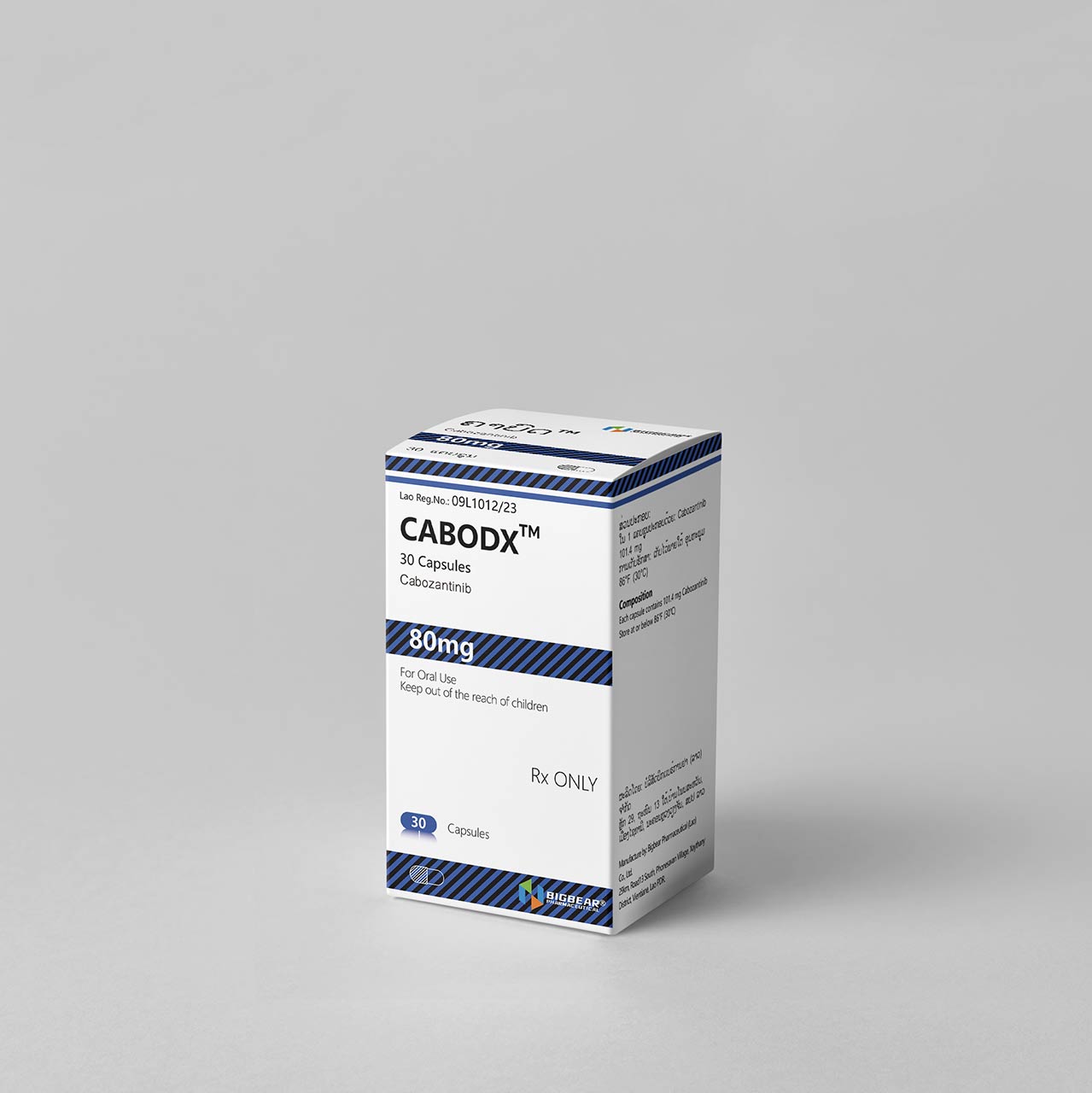CABODX,Cabozantinib 20/60/80mg
Manufactor:Bigbear Pharmaceutical Laos
Introduction:Cabozantinib was approved by the FDA on November 29, 2012 for the treatment of progressive and metastatic medullary thyroid cancer; for the treatment of advanced renal cancer; and for the second-line treatment of advanced liver cancer. Cabozantinib is a multi-receptor tyrosine kinase inhibitor. Cabozantinib inhibits RET, hepatocyte growth factor receptor, vascular endotheliogenic factor receptor 1 (VEGFR-1, VEGFR-2, VEGFR-3), stem cell growth factor receptor (KIT), and tyrosi...
chat onlinePhone: +8562052137046
Recommended
- details
【Drug Name】
Name:Cabozantinib Tablets/Capsules
Product Name: CABODX
【Specification】20/60/80mg
【Indications】
CABODX is a prescription medicine used to treat:
• people with kidney cancer (renal cell carcinoma). CABODX may be used:
○ alone to treat people with renal cell carcinoma (RCC) that has spread (advanced RCC).
○ in combination with nivolumab when your cancer has spread (advanced RCC), and you have not already had treatment for your advanced RCC.
• people with liver cancer (hepatocellular carcinoma) who have been previously treated with the medicine sorafenib.
It is not known if CABODX is safe and effective in children.
【Recommended Dosage】
• Take CABODX exactly as your healthcare provider tells you to take it.
• Do not take CABODX with food. Take CABODX at least 1 hour before or at least 2 hours after eating.
• Swallow CABODX tablets whole.
• Do not crush CABODX tablets.
• If you miss a dose and your next scheduled dose is in:
○ less than 12 hours, take your next dose at the normal time. Do not make up the missed dose.
○ 12 hours or more, take the missed dose as soon as you remember. Take your next dose at the normal time.
【Side Effects】
CABODX may cause serious side effects, including:
• bleeding (hemorrhage). CABODX can cause severe bleeding that may lead to death. Tell your healthcare provider right away if you get any signs of bleeding during treatment with CABODX, including:
o coughing up blood or blood clots o red or black (looks like tar) stools
o menstrual bleeding that is heavier than normal coffee-grounds
o any unusual or heavy bleeding o vomiting blood or if your vomit looks like
• a tear in your stomach or intestinal wall (perforation) or an abnormal connection between 2 parts of your body (fistula). Tell your healthcare provider right away if you get tenderness
or pain in your stomach-area (abdomen) that is severe or that does not go away.
• blood clots, stroke, heart attack, and chest pain. Get emergency help right away if you get:
o swelling or pain in your arms or legs o sudden confusion, trouble speaking or
o shortness of breath understanding o feel lightheaded or faint
o sudden trouble seeing in one or both eyes o sweating more than usual
o sudden trouble walking o numbness or weakness of your face, arm or leg, especially on one side of your body
o dizziness, loss of balance or coordination o a sudden severe headache
• high blood pressure (hypertension). Hypertension is common with CABODX and sometimes can be severe. Your healthcare provider will check your blood pressure before starting CABODX
and regularly during treatment with CABODX. If needed, your healthcare provider may prescribe medicine to treat your high blood pressure. Tell your healthcare provider if you develop severe
headaches, nose bleeds, tiredness or confusion, vision changes, chest pain, trouble breathing, irregular heartbeat, or blood in your urine.
• diarrhea. Diarrhea is common with CABODX and can be severe. If needed, your healthcare provider may prescribe medicine to treat your diarrhea. Tell your healthcare provider right away, if you
have frequent loose, watery bowel movements.
• a skin problem called hand-foot skin reaction. Hand-foot skin reactions are common and can be severe. Tell your healthcare provider right away if you have rashes, redness, pain, swelling,
or blisters on the palms of your hands or soles of your feet.
• liver problems. Liver problems may happen during treatment with CABODX. When CABODX is taken in combination with nivolumab, severe changes in liver function tests may happen more often
than if you take CABODX alone. Your healthcare provider will do blood tests to check your liver function before and during treatment with CABODX. Tell your healthcare provider right away if you
develop symptoms of liver problems including: yellowing of your skin or the whites of your eyes, severe nausea or vomiting, pain on the right side of your stomach-area (abdomen), dark urine,
bleeding or bruising more easily than normal.
• adrenal gland problems. Your healthcare provider will monitor you for this problem. Your healthcare provider may prescribe hormone replacement therapy or corticosteroid medicines if needed.
Tell your healthcare provider right away if you develop any of the following signs or symptoms: extreme tiredness, dizziness or fainting, weakness, nausea, or vomiting.
• protein in your urine and possible kidney problems. Symptoms may include swelling in your hands, arms, legs, or feet. Your healthcare provider will check you for this problem during
treatment with CABODX.
• severe jaw bone problems (osteonecrosis). Your healthcare provider should examine your mouth before you start and during treatment with CABODX. Tell your dentist that you are taking
CABODX. It is important for you to practice good mouth care during treatment with CABODX. Tell your healthcare provider right away if you develop any symptoms of jaw problems, including:
jaw pain, toothache, or sores on your gums.
• wound healing problems. Wound healing problems have happened in some people who take CABODX. Tell your healthcare provider if you plan to have any surgery before or during treatment
with CABODX.
o You should stop taking CABODX at least 3 weeks before planned surgery.
o Your healthcare provider should tell you when you may start taking CABODX again after surgery.
• Reversible Posterior Leukoencephalopathy Syndrome (RPLS). A condition called reversible posterior leukoencephalopathy syndrome can happen during treatment with CABODX.
Tell your healthcare provider right away if you have headaches, seizures, confusion, changes in vision, or problems thinking.Your healthcare provider may change your dose, temporarily stop,
or permanently stop treatment with CABODX if you have certain side effects.
The most common side effects of CABODX include:
• tiredness • decreased appetite
• nausea • vomiting
• weight loss • constipation
• difficulty speaking
The most common side effects of CABODX when used in combination with nivolumab include:
• tiredness • mouth sores • rash • low thyroid hormone levels (hypothyroidism)
• pain in muscles, bones, and joints • decreased appetite • nausea
• changes in the way things taste • stomach-area (abdominal) pain • cough
• upper respiratory tract infection
CABODX may cause fertility problems in females and males, which may affect your ability to have children. Talk to your healthcare provider if you have concerns about fertility. These are not all of
the possible side effects of CABODX. Call your doctor for medical advice about side effects.
【Storage】
• Store CABODX at room temperature between 68°F to 86°F (20°C to 30°C).
Keep CABODX and all medicines out of reach of children.

 中文
中文